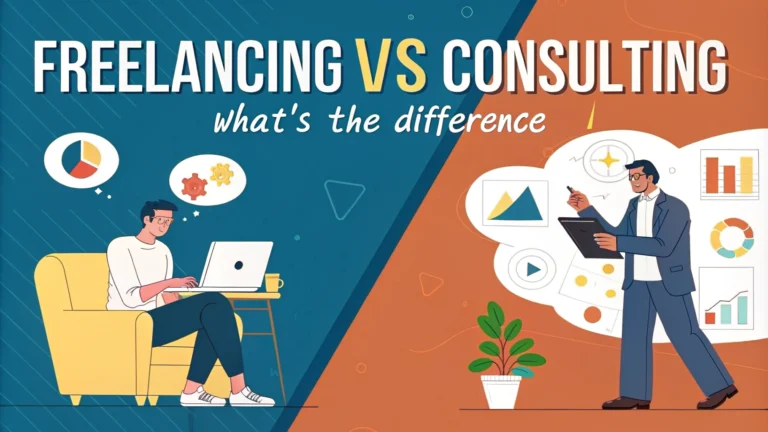Many professionals face a decision between pursuing **freelancing** or **consulting** as their next career move. While these terms are often used interchangeably, they represent distinct business models with unique characteristics and opportunities.
The key differences lie in their **scope**, **pricing models**, and **client relationships**. Freelancers typically work on specific tasks or projects, while consultants provide expert advice and strategic guidance.
Key Characteristics of Freelancing
- Project-based work
- Hourly or fixed-rate pricing
- Multiple clients simultaneously
- Focus on tactical execution
- Direct service delivery
Common Freelancing Fields
- Content Writing
- Graphic Design
- Web Development
- Social Media Management
- Virtual Assistance
Core Elements of Consulting
- Strategic advisory services
- Value-based pricing
- Long-term client relationships
- Industry expertise focus
- Problem-solving approach
Income Potential and Business Structure
| Aspect | Freelancing | Consulting |
|---|---|---|
| Pricing Model | Time-based/Project-based | Value-based/Retainer |
| Typical Income Range | Variable, project-dependent | Higher, more stable |
| Business Structure | Simple, individual | Often more formal |
Skills Required for Success in Different Roles
Moving from **freelancing** to **consulting** requires specific expertise and capabilities that set you apart in the market. Understanding these requirements helps determine which path aligns with your experience.
Essential Freelancer Skills
- Technical proficiency in chosen field
- Time management and organization
- Basic project management
- Communication and follow-through
- Self-discipline and motivation
Key Consulting Requirements
- Deep industry knowledge
- Problem analysis and solution design
- Business strategy development
- Leadership and team guidance
- Presentation and negotiation skills
Building Strong Client Relationships
**Client management** shapes the success of both freelancing and consulting businesses. Each role demands different approaches to maintaining professional relationships.
| Aspect | Freelancer Approach | Consultant Approach |
|---|---|---|
| Communication Style | Task-focused, regular updates | Strategic, advisory discussions |
| Meeting Frequency | Project milestones | Regular scheduled sessions |
| Deliverables | Specific outputs | Recommendations and plans |
Marketing Your Services Effectively
**Personal branding** and **marketing strategy** differ significantly between freelancing and consulting roles.
Freelance Marketing Tactics
- Portfolio development
- Social media presence
- Freelance platforms
- Network referrals
- Case studies of completed projects
Consulting Marketing Approaches
- Thought leadership content
- Speaking engagements
- Professional networking
- Industry publications
- Partnership development
Choosing Your Professional Path
The choice between freelancing and consulting depends on your **experience level**, **career goals**, and **preferred work style**.
“Choose the path that aligns with your expertise level and how you prefer to deliver value to clients.”
Questions to Consider
- What type of work energizes you?
- Do you prefer tactical or strategic work?
- What income level matches your goals?
- How much business structure do you want?
- What is your current expertise level?
Freelancing vs Consulting FAQs
General Questions
Q: What is the main difference between freelancing and consulting?
A: Freelancers typically provide specific deliverables or services, while consultants offer expert advice and strategic guidance. For example, a freelance writer delivers articles, while a business consultant provides strategic recommendations.
Q: Which pays more – freelancing or consulting?
A: Consultants generally command higher rates due to their specialized expertise and strategic focus. Average consulting rates range from $100-300/hour, while freelance rates typically range from $30-150/hour.
Q: Can someone be both a freelancer and consultant?
A: Yes. Many professionals combine both roles, offering hands-on services as freelancers while providing strategic advice as consultants.
Freelancing-Specific Questions
Q: What industries have the highest demand for freelancers?
A: Top industries include:
- Web development
- Content writing
- Graphic design
- Digital marketing
- Video editing
Q: How do I transition from full-time employment to freelancing?
A: Start by building a portfolio, establishing an online presence, securing initial clients through platforms like Upwork or Fiverr, and gradually scaling your client base.
Consulting-Specific Questions
Q: What qualifications do I need to become a consultant?
A: Requirements typically include:
- Extensive industry experience (5+ years)
- Proven track record of success
- Relevant certifications
- Strong analytical skills
Q: How do I price my consulting services?
A: Consider factors like expertise level, industry standards, project scope, and value delivered. Common pricing models include hourly rates, project-based fees, or retainer agreements.
Long-tail Keyword Questions
Q: How do I start a freelance business with no experience?
A: Begin by developing skills through online courses, creating sample work, offering services at competitive rates, and building testimonials from initial clients.
Q: What is the best consulting niche for beginners?
A: Popular entry-level consulting niches include:
- Social media management
- Small business operations
- HR consulting
- Marketing strategy
Q: How much should I charge as a freelance consultant in 2023?
A: Current market rates by experience level:
| Experience Level | Hourly Rate Range |
|---|---|
| Entry Level | $50-100 |
| Mid Level | $100-200 |
| Expert Level | $200-500+ |
Q: Which freelance skills will be in demand for 2024?
A: Emerging high-demand skills include AI prompt engineering, blockchain development, cybersecurity, data analytics, and sustainability consulting.
Q: Do I need an LLC to start consulting?
A: While not mandatory, forming an LLC provides liability protection and tax benefits. Requirements vary by location and service type.



















